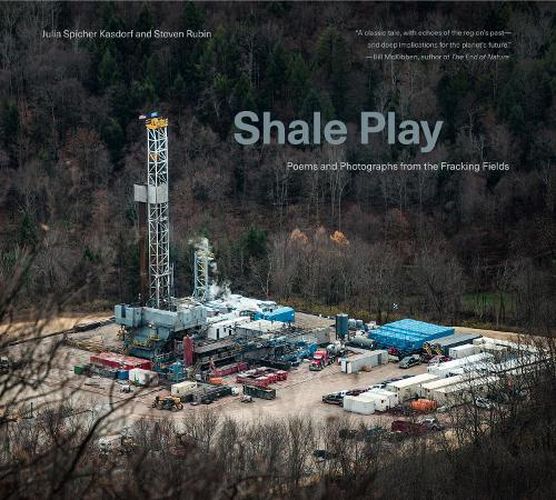Readings Newsletter
Become a Readings Member to make your shopping experience even easier.
Sign in or sign up for free!
You’re not far away from qualifying for FREE standard shipping within Australia
You’ve qualified for FREE standard shipping within Australia
The cart is loading…






In Shale Play, acclaimed poet Julia Spicher Kasdorf and award-winning documentary photographer Steven Rubin explore the small towns, farms, and forests of Appalachian Pennsylvania to gather the stories of these places and the working people who inhabit them.
In the parlance of the oil and gas industry, shale play refers to a region exploited for its natural gas by means of hydraulic fracturing and horizontal drilling-transient industrial processes that often occur far from the populations that benefit from them. Amid polarized claims about fracking and pressure to develop these areas around the world, this project gathers evidence from everyday life in the Marcellus Shale Play. Kasdorf and Rubin follow in the footsteps of the documentarians of the 1930s, such as the artists and writers of the Works Progress Administration, taking a deliberate and thoughtful approach to gather the stories of workers on pipelines and well pads, landowners and leaseholders, waitresses, ministers, farmers, retired miners, teachers, and neighbors. The resulting collage of vivid oral and pictorial testimony reveals the natural beauty of rural places as well as the disturbance and spectacle fracking creates.
A passionate work of witness, Shale Play invites the reader to look beyond the easy caricatures of the white working class to create an urgent, authentic representation of a sacrifice zone that fuels America.
$9.00 standard shipping within Australia
FREE standard shipping within Australia for orders over $100.00
Express & International shipping calculated at checkout
In Shale Play, acclaimed poet Julia Spicher Kasdorf and award-winning documentary photographer Steven Rubin explore the small towns, farms, and forests of Appalachian Pennsylvania to gather the stories of these places and the working people who inhabit them.
In the parlance of the oil and gas industry, shale play refers to a region exploited for its natural gas by means of hydraulic fracturing and horizontal drilling-transient industrial processes that often occur far from the populations that benefit from them. Amid polarized claims about fracking and pressure to develop these areas around the world, this project gathers evidence from everyday life in the Marcellus Shale Play. Kasdorf and Rubin follow in the footsteps of the documentarians of the 1930s, such as the artists and writers of the Works Progress Administration, taking a deliberate and thoughtful approach to gather the stories of workers on pipelines and well pads, landowners and leaseholders, waitresses, ministers, farmers, retired miners, teachers, and neighbors. The resulting collage of vivid oral and pictorial testimony reveals the natural beauty of rural places as well as the disturbance and spectacle fracking creates.
A passionate work of witness, Shale Play invites the reader to look beyond the easy caricatures of the white working class to create an urgent, authentic representation of a sacrifice zone that fuels America.